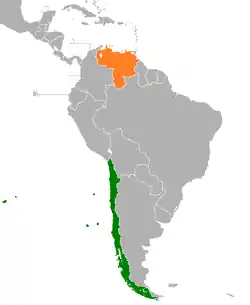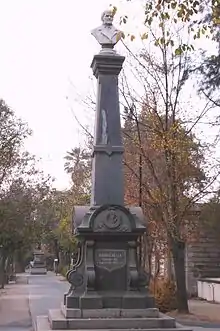Chile–Venezuela relations
Chile–Venezuela relations refers to the diplomatic relations between the Republic of Chile and the Bolivarian Republic of Venezuela. Both nations are members of the Community of Latin American and Caribbean States, Group of 77, Latin American Integration Association, Organization of American States, Organization of Ibero-American States and the United Nations.
 | |
Chile |
Venezuela |
|---|---|
History
Both Chile and Venezuela share a common history in the fact that both nations were once part of the Spanish Empire. During the Spanish colonial period, Chile was then part of the Viceroyalty of Peru and administered from Lima while Venezuela was governed from the Viceroyalty of New Granada in Bogotá. In 1810, both Chile and Venezuela declared their independence from Spain with each nation obtaining independence in 1818 and 1830, respectively. Chilean liberator, Bernardo O'Higgins, while in exile in Peru was encouraged by Venezuelan liberator Simón Bolívar to join the nationalist effort there to free Peru from Spain.

In 1858, Chile and Venezuela formally established diplomatic relations. In 1913, Chile established a resident diplomatic legation in Caracas while Venezuela followed-suit in 1923 by establishing a diplomatic legation in Santiago. In 1829, Venezuelan humanist and diplomat, Andrés Bello, moved to Chile where he accepted a post in the Chilean Ministry of Foreign Affairs in Santiago. In Chile, Bello became a Senator and founded the University of Chile. Both nations claim Bello as their own and have featured him on the old 2,000 Venezuelan bolívar and the 20,000 Chilean peso notes.
In 1973, Chile experienced a coup d'état against the government of President Salvador Allende by General Augusto Pinochet. As a result, approximately 24,000 Chileans sought asylum in Venezuela.[1] Many Chilean refugees returned to Chile in the 1990s after democracy was restored in the country.
In the early 21st century, relations between both nations have been close as both nations worked closely for deeper South American integration. In 1999, Hugo Chávez became President of Venezuela. In 2006, Michelle Bachelet was elected President of Chile. Both leaders maintained a close political relationship as both leaders were part of the "Pink tide" left-wing governments in Latin American democracies. Both countries were founding members of the now defunct Union of South American Nations.
In 2013, Nicolás Maduro became President of Venezuela after the death of President Chávez. Since President Maduro's time in office, the Crisis in Venezuela have reached drastic levels and have contributed to the Venezuelan refugee crisis with over 200,000 Venezuelans immigrating and seeking asylum in Chile.[2] As a result, in June 2019, Chile placed visa restrictions on Venezuelans entering the country.[3] In response, Venezuela imposed visa restrictions on Chilean nationals visiting the country. In January 2019, as a result of the Venezuelan presidential crisis, the Chilean government recognized Juan Guaidó as acting President of Venezuela.[4]
Bilateral agreements
Both nations have signed several agreements such as an Extradition treaty (1962); Agreement on Cultural Cooperation (1990); Agreement on Scientific and Technical Cooperation (1990); Agreement on Prevention, Control, Fiscalization and Repression of the Abuse and Illicit Traffic of Narcotic Drugs and Psychotropic Substances (1993); Agreement on the Avoidance of double taxation in relation to international maritime and air transport (1994); Agreement on the Reciprocal Protection of Investments (1994); Agreement on Tourism (1994); and an Agreement on Social Security (2005).[5][6]
Transportaiton
There are direct flights between both nations with Estelar Latinoamerica.
Trade
In 2018, trade between both nations totaled US$109 million.[7] Chile's main exports to Venezuela include: lentils, powdered milk, tuna, juices and copper. Venezuela's main exports to Chile include: urea, steel and iron tubes, cables, and steel or iron wires.[7]
Resident diplomatic missions
- Chile has an embassy in Caracas and a consulate in Puerto Ordaz.[8]
- Venezuela has an embassy in Santiago.[9]
See also
References
- Por qué Chile facilita la llegada de inmigrantes de Venezuela y pone dificultades a los de Haití (in Spanish)
- En Chile hay más de 1,2 millones de extranjeros y venezolanos desplazan a los peruanos (in Spanish)
- Response for Venezuelans
- Chile recognizes opposition leader Guaido as Venezuela's president
- Tratados firmados entre Chile y Venezuela (in Spanish)
- MRE: Acuerdos y tratados Bilaterales con Venezuela (in Spanish)
- Ficha País: Chile-Venezuela (in Spanish)
- Embassy of Chile in Caracas
- Embassy of Venezuela in Santiago

